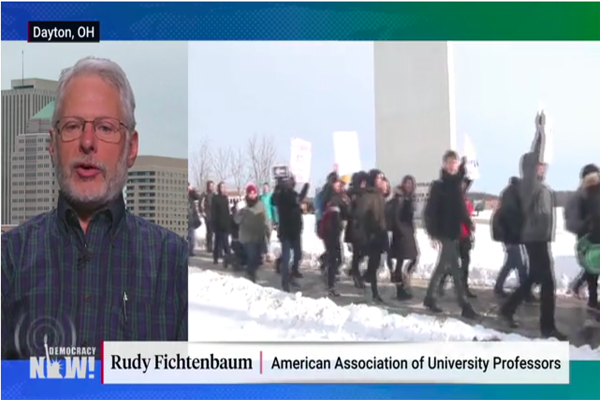
Excerpt from Democracy Now
In Dayton, Ohio, faculty members at Wright State University have just concluded one of the longest public university strikes in U.S. history. On Sunday, the university’s administration reached a tentative contract agreement with the faculty union’s executive committee, which union members will vote to ratify in coming days. The strike began late last month, when the university imposed a contract on faculty members that worsened working conditions and decreased benefits. When the administration refused to negotiate, 85 percent of Wright State University’s union members voted to authorize a strike. We speak with Rudy Fichtenbaum, president of the American Association of University Professors. He is the chief negotiator for the association’s chapter at Wright State University, where he is professor emeritus of economics.
Transcript
AMY GOODMAN: This is Democracy Now! I’m Amy Goodman, with Juan González.
JUAN GONZÁLEZ: Well, as public school teachers in Denver, Colorado, take to the picket lines, we turn now to a higher education strike that’s received far less attention. In Dayton, Ohio, faculty members at Wright State University have just concluded one of the longest public university strikes in U.S. history. On Sunday, the university’s administration reached a tentative contract agreement with the faculty union’s executive committee, which union members will vote to ratify in coming days.
The strike began last month when the university imposed a contract on faculty members that worsened labor conditions and decreased benefits. When the administration refused to negotiate, 85 percent of Wright State University’s union members voted to authorize a strike. This is history professor Noeleen McIlvenna describing some of the faculty’s concerns that led to the strike.
NOELEEN McILVENNA: The number one is workload.
LOGAN MARTINEZ: The workload, OK.
NOELEEN McILVENNA: Because what that translates to is much less time for each individual student, much less time for research. When teachers have to teach more and more and more students, each student gets less and less, because a human only has so much time and energy in a given day. And so, we would have to spread ourselves so thin that everything would give. And that—so that’s the number one issue.
LOGAN MARTINEZ: OK.
NOELEEN McILVENNA: There are several others. Another one that’s very concerning to us is job security for the nontenured faculty.
AMY GOODMAN: Wright State University has faced financial problems after burning through $131 million of its reserves in the span of five years. The administration claimed cuts in faculty benefits were financially necessary, but faculty members fought back, saying professors and their students shouldn’t pay the consequences for administrative fiscal mismanagement.
Striking faculty spent 20 days on the picket lines in freezing temperatures, demanding better healthcare coverage, workload policies and pay bumps. The professors were joined by union members, local politicians, students and community members. After the university’s administration and faculty union reached a tentative contract, the striking faculty members returned to class Monday.
For more, we go to Dayton, Ohio, where we’re joined by Rudy Fichtenbaum, the president of the American Association of University Professors, chief negotiator for the association’s chapter at Wright State University, where he’s professor emeritus of economics.
Rudy Fichtenbaum, welcome to Democracy Now! Can you talk about the significance of this strike, what you called for, what you got, and whether you think it’s going to pass in the vote?
RUDY FICHTENBAUM: Yes. Well, I think that the significance of this strike is that a group of faculty really stood up for maintaining quality education. And one of the things that we’ve seen is really the undermining of public higher education in general, as states have cut funding and limited opportunities to increase tuition. And this has led universities, like Wright State, to look for a variety of schemes to increase revenue. And that was exactly—because of their incompetence, that failed, and that’s what cost the university the $130 million.
But what is, I think, so significant here is that the university then seized on this as an opportunity, really, to try and break the faculty union. This was really never about the money. This was about trying to silence the union, silence the voice of the faculty. It was about power and control. And that’s why they attacked the workload agreement—the workload part of the agreement, the employment security for non-tenure-track faculty, our merit system. They attacked that—they changed that unilaterally when they imposed the contract. And we saw—and also healthcare, taking away our right to bargain over healthcare. All of these things were really designed to weaken the faculty union, which had been very critical of the spending and the priorities of the administration, and of the incompetence of the board in allowing the university to squander $131 million of reserves.

